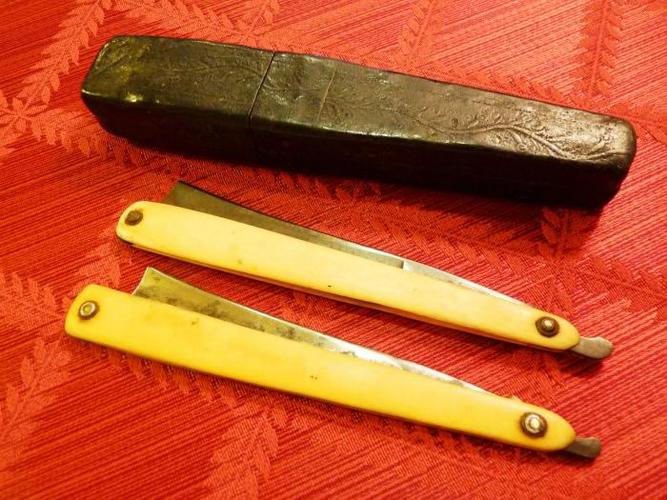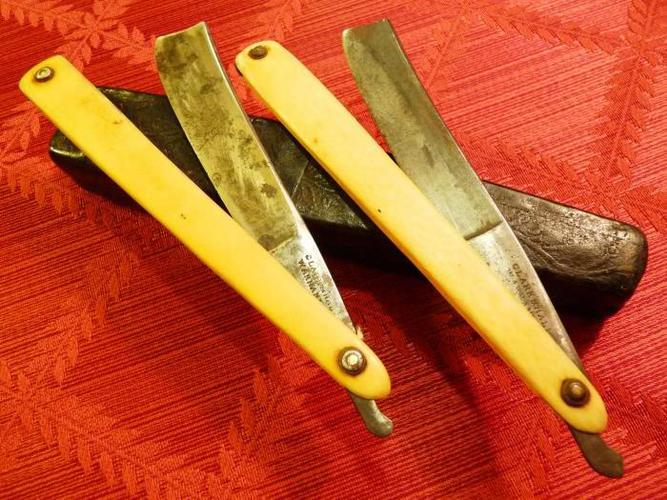Results 1 to 10 of 55
Hybrid View
-
02-25-2017, 05:47 PM #1
 Early Razors and Dating them.....or not
Early Razors and Dating them.....or not
Examples from the presumed 1810s-1820s era. The Greaves is the only one I dated more positively to 1816-1826, and undoubtedly many folks would look at the tail and say it dates toward the latter of that range..... well perhaps. The patent temper being the Greaves' ugly twin brother many would attempt to label with a date earlier based on the tail but who can say for certain?! Thats a lot of assumption based on a small detail and it happens with regularity anytime a razor with an unknown date range for the maker, or for a razor with an unknown maker for that matter. The Barlow Travel razor, similar enough blade shape, tail and scales to those in the same 1810s-1830s range but I don't know any of the dates of operation and which Barlow, James or John and prior to sons etc to be able to date this one. Lots of conjecture on the forums and lots of "that blade is shaped like mine here" whereas dates of operation tell a more accurate tale than blade style don't they?
My rant may be mistaken as complaining if don't clarify the reason for this post. How grateful we all are here for those who know how to dig deeper and who share it regularly! Neil before he passed, Zack, Martin, Scienceguy, just to name a few who regularly share/shared freely. Thank you All!Silverloaf
-
The Following User Says Thank You to silverloaf For This Useful Post:
ajkenne (03-02-2017)
-
02-25-2017, 05:50 PM #2

Those are some nice looking razors.
-
02-25-2017, 05:55 PM #3
-
02-25-2017, 06:13 PM #4Senior Member


- Join Date
- Jun 2013
- Location
- Pompano Beach, FL
- Posts
- 4,046
Thanked: 636
Try this site. https://acierfondu.wordpress.com
It has archives of older razors
-
-
02-26-2017, 05:32 PM #5
-
02-28-2017, 07:49 PM #6

The 1800-1820 period is especially difficult to pin down.
The blade & scale styles present in the 1816 "Smith's Key" were no doubt around before it's publication and many stuck around long after. Style alone doesn't really get us there, and tail length & shape is not the indicator we would really hope for. Likewise, the curvature of the scales is at best a vague indicator. Razors in the "Smith's Key" exhibit a range. (It's worth browsing the other pages of razors, too -- the 'portable razors' were the travel sized models.)
The only remaining indicator is manufacturer's stamp, which means stuff with generic stamps like 'warranted' or 'refined steel', etc, can't be pinned to the 1800-1820 range.
Manufacturer's stamps are better. Robert Wade razors have roughly 50/50 chance of being pre-1820 since his mark was used from roughly 1816 to 1827.
Clark & Hall are a pretty good bet, but they did make things with that stamp after 1820.
Marsden-stamped razors are probably from somewhere in the range, and generally large razors with a squared spine with 'Magnum Bonum' etched on the top are too.
Rhodes & Champion rolled up their business early in the 1820's, so likewise with theirs.
"Styring & Co" stamps as well as "Wilson & Co" also date mostly to that period.
There are others, but it takes individual research on the companies.-Zak Jarvis. Writer. Artist. Bon vivant.
-
The Following User Says Thank You to Voidmonster For This Useful Post:
MisterClean (03-02-2017)
-
02-28-2017, 10:12 PM #7

"Smiths key" is a drool magnet for me. Along with the Magnum Bonum marking there would also be "Ne Plus Ultra" and "Ground on a 4 Inch Wheel" I believe, correct? The Barlow in this grouping is sized appropriately as a travel razor and interestingly enough has "ground on a 4 inch wheel" etched on the spine.
Silverloaf
-
03-01-2017, 08:03 PM #8
-
03-02-2017, 01:47 AM #9
-
03-02-2017, 02:47 AM #10

Maybe some comparisons and definite examples would be useful here.

First, a razor from the late 1700's to very early 1800's.
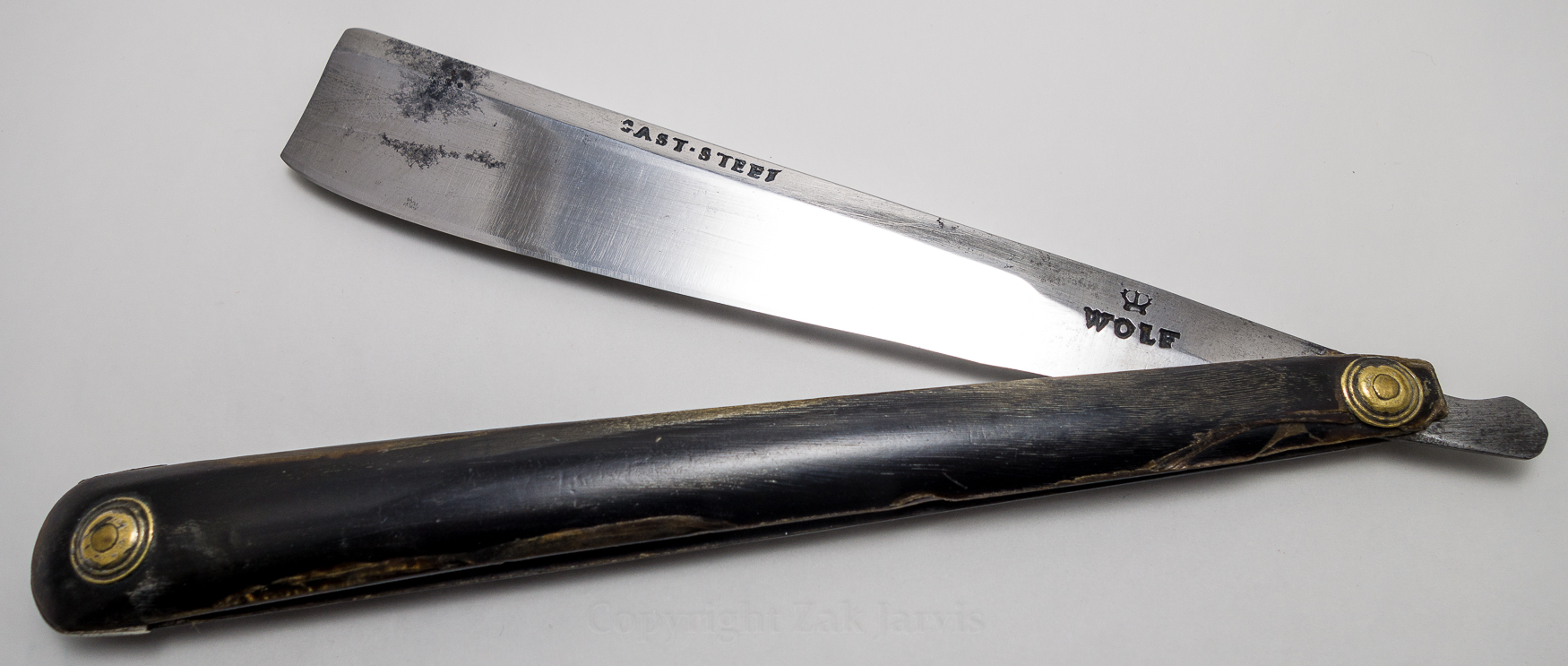
(also a damn fine shaver!)
It's a John Shepherd 'Wolf' branded razor. This style with very little division between blade and tang seems to have died out at the turn of the century, but it's hard to really know for sure. Either way, they definitely weren't made after 1820, because I've never seen a manufacturer that got started then who made one. (If someone can prove me wrong here, I really look forward to it!)
Next up:
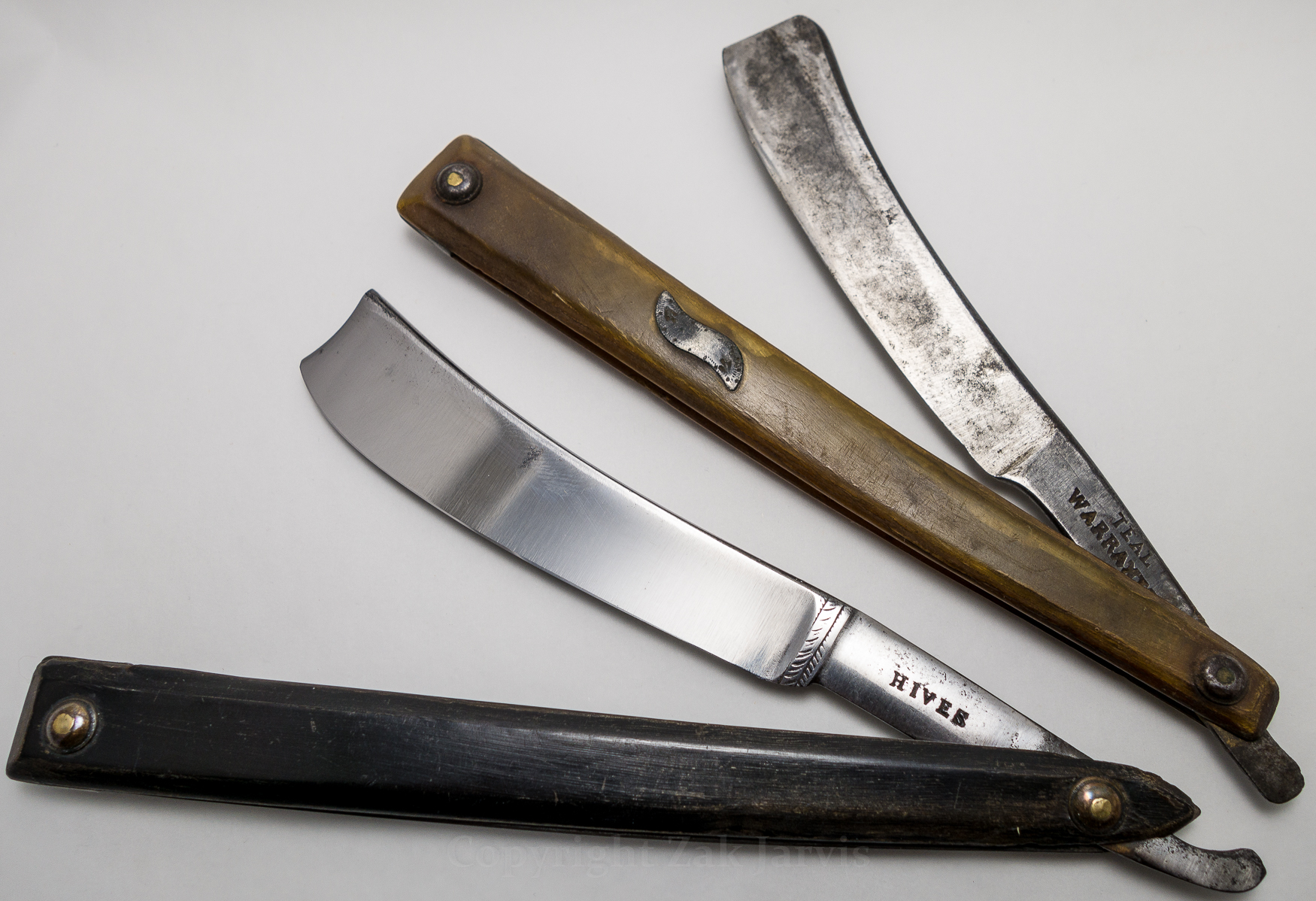
William Teal and Joseph Hives. Both manufacturers got their start in the 1700's and then never show up in a directory again. Joseph Hives never showed up in a directory, and the only information about him comes from apprentice registries and this razor (I think I've seen one other).
The Teal razor might possibly be late 1700's. It came from a very old barn in the north east as part of a lot that included revolutionary war era guns, and we really just don't know what sort of variety there was in Sheffield-made razors in the late 1700's. I doubt very much they were all like the Wolf razor.
Features to note in these two: the blades are very smiley. Curved, even. Also, the Hives razor has that neat little bit of ornament around the tang which shows up in some of the Smith's Key illustrations.
On to ...
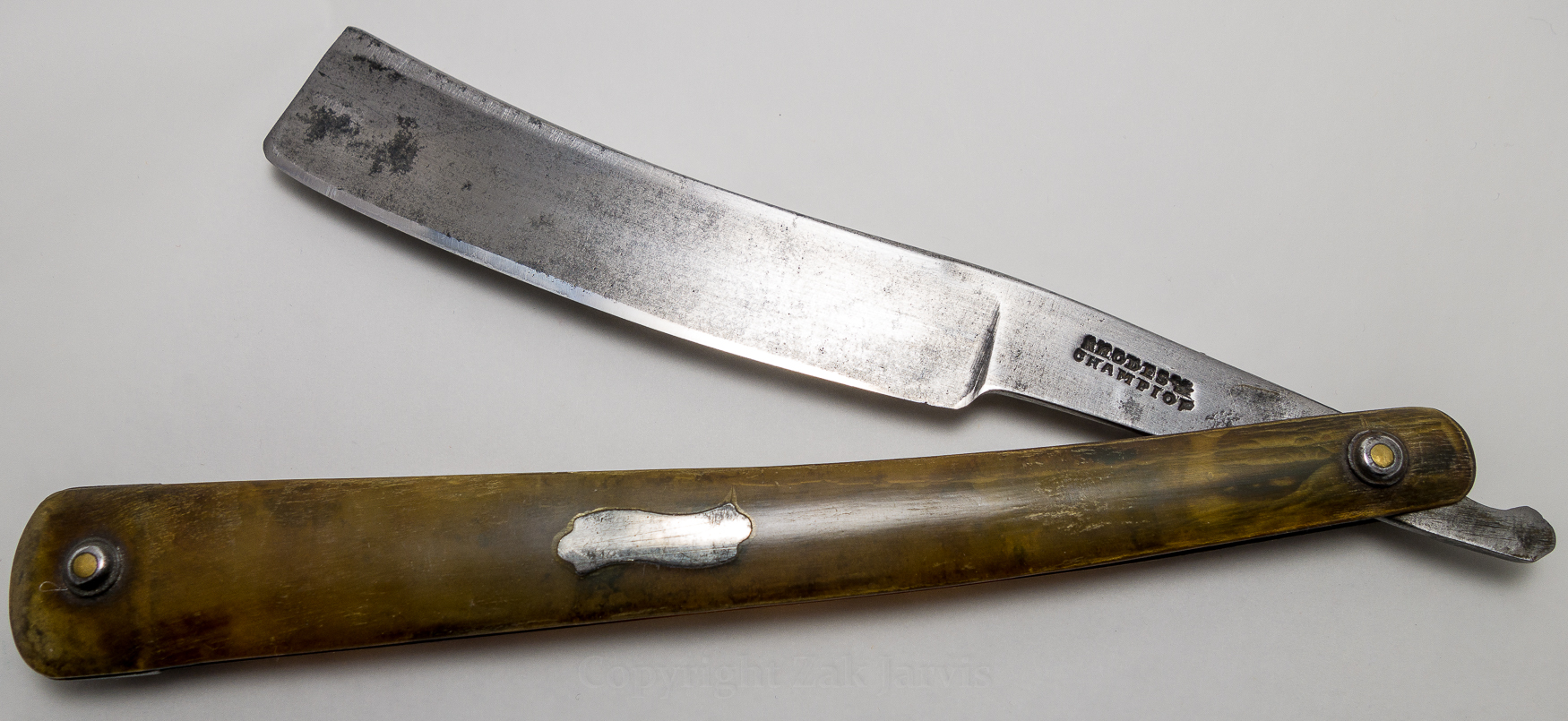
Rhodes & Champion. These you can be pretty sure of, as David Champion shuffled off into the hereafter in 1817. Oddly, that didn't stop Ebenezer Rhodes from selling the patented frameback he bought from Bennington Gill in 1824 as 'Champion's Patent'.
Rhodes needed money though, since he was using the razor business to bankroll his true calling as a writer. He put on a number of plays, but his most enduring work was 'Peak Scenery'. It's a book of prose descriptions of the landscape in Derbyshire. As riveting as that sounds to modern ears, it was about as popular in its time. Were it not for wealthy friends, Ebenezer Rhodes would likely have died in the poorhouse.
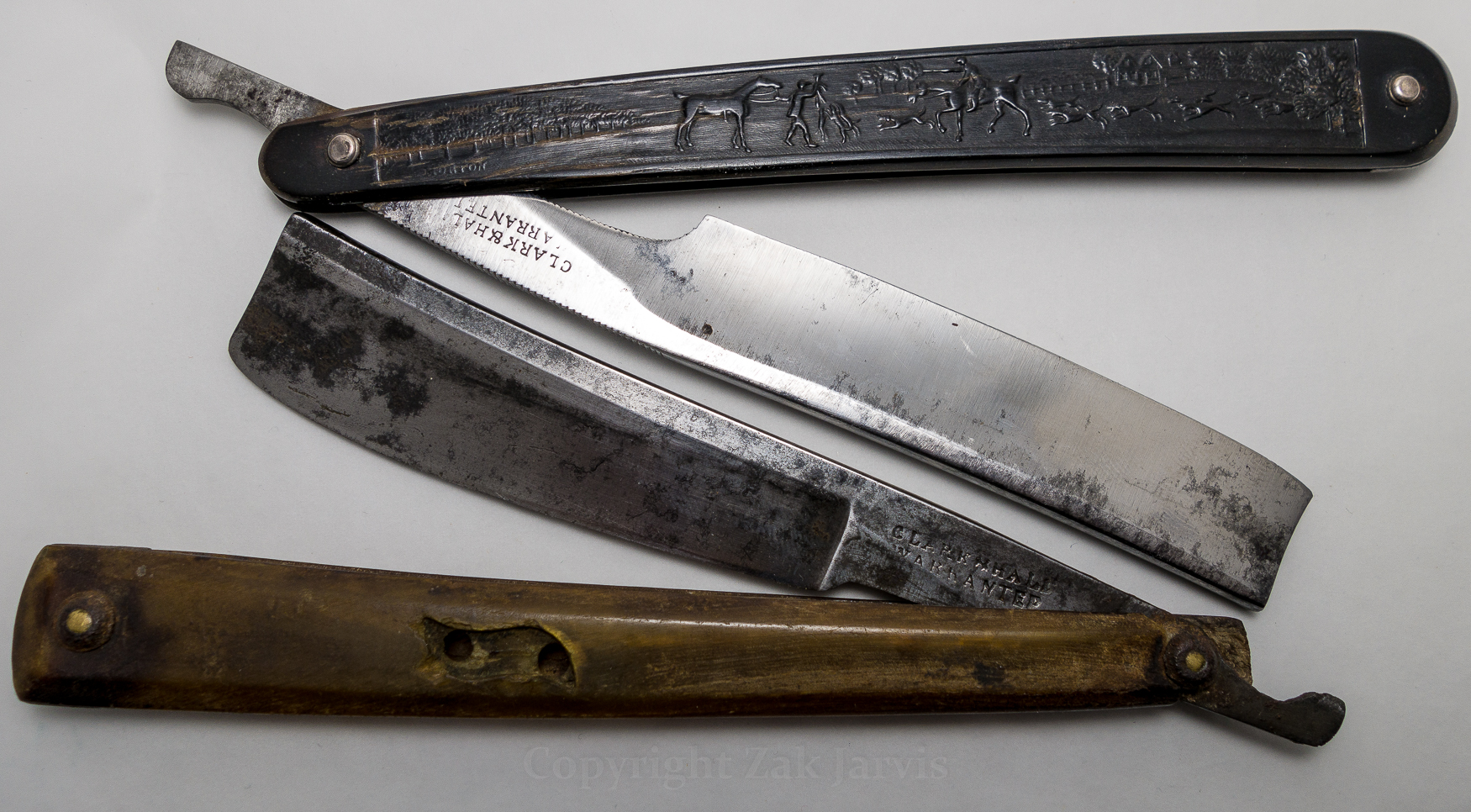
Which brings us to this pair of Clark & Hall razors. The one in the black pressed horn scales is almost certainly post-1820 (if my memory serves, the scale presser who made the fancy scales wasn't in business until 1822). The much grungier one below is probably from our target period 1805-1820, emphasis on the first ten years of the range. That blade style just doesn't seem to have been done by post-1820 manufacturers.
Also noteworthy -- the later Clark & Hall has a very London-styled tail. I hardly ever see those on Sheffield-branded razors (but regularly on Sheffield-made razors for London firms).
(continued in next post, I hit the image limit.)-Zak Jarvis. Writer. Artist. Bon vivant.
-
The Following 9 Users Say Thank You to Voidmonster For This Useful Post:
32t (03-02-2017), ajkenne (03-02-2017), AntiqueHoosier (03-02-2017), Dieseld (03-02-2017), GreenRipper (03-02-2017), karlej (03-02-2017), RezDog (03-02-2017), silverloaf (03-02-2017), xiaotuzi (03-06-2017)


 215Likes
215Likes LinkBack URL
LinkBack URL About LinkBacks
About LinkBacks






 Reply With Quote
Reply With Quote



